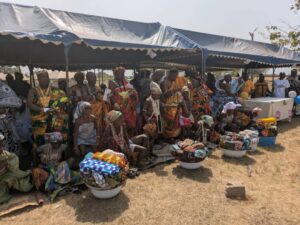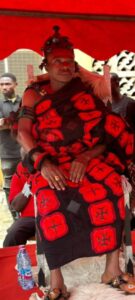
Jean Menssa, Chairperson of the Electoral Commission
Contrary to assertions been championed by some Civil Society Organisations (CSOs), under the Ghana Anti-Corruption Coalition (GACC), that the Electoral Commission should hold on with the compilation of a new voters register until the National Identification Authority (NIA) is done with its work, checks by the eveningmailgh.com has revealed that may not be possible if we want to have an election this year.
The coalition involving 18 CSOs has stated that the more appropriate, most lawful and financially responsible and justified approach for the EC instead of compiling a new voters register will be for them to let the National Identification Authority (NIA) collect and process data. It explains that the NIA will then send the EC the subset of the information needed for the purpose of elections.
Subsequently, the Executive Secretary of the NIA, Prof Ken Attafuah, has stated that the Authority has all the biometric data the EC will need for the creation of a new voters’ register.
According to Prof Attafuah, the NIA’s enrolment platform captures the biographic details – which includes the iris, fingerprints, facials – the EC will require in compiling a new electoral roll.
“The only thing the EC needs, which the NIA does not take, is polling station number or name but that is as easy as ABC to get with technology; it is not a problem at all,” he added.
However the NIA’s claim per our checks reveal that the EC relying on the NIA data would be untenable for an election that is timebound.
According to our sources, the NIA as at 1st December, told EC they had registered 5 million and had issued 3.5million Ghana cards with data on Ghanaians collected from age 15.
It should be noted that the NIA over the weekend stated that they had registered 7 million and issued 3.6 million Ghana cards even at a time when they say they have enough resources to fast-track their activities.
After two years of collecting data which includes Ghanaians from age 15, the NIA says its hoping to acquire 3,000 new registration equipment to speed up its registration process and therefore cannot commit to completing their registration by March or June, which is when the EC expects to start voter registration or verification.
From all intents and purposes, it is obvious that the EC cannot wait for the completion of NIA data collection as it is very unlikely that the NIA can complete registration of potential 11 or 12 million Ghanaian voters by end of March or even by June and issue all of them with Ghana Cards per its track record so far.
Again, our checks reveal that even after the cards have been issued, the EC need to verify them. This verification will be done with devices that can read smart cards as the NIA issues such cards as the Ghana card. However, the EC currently does not have such devices and it is not clear whether NIA can provide the EC with smart card-enabled verification devices for the 32,000 polling stations.
Also if voters have to come to polling station, to show their card which must be verified somehow, their demographics need to be captured and verified including biometrics. At this point the EC might as well capture their data afresh.
Nokia 3310 and Huawei Y9
Meanwhile, Jacob Osei Yeboah, a 2016 Independent Presidential Aspirant, has stated that various regional Biometric Voter Registration (BVR) Pricing Benchmarking Studies do not support figures quoted by IMANI Ghana, leaders of the 18 CSOs against the compilation of new voters register.
Imani Ghana has claimed that the proposed pricing suggested by the EC for the BVRs and Biometric Verification Devices (BVDs) it intends to buy at $3,500 and $400 respectively are too high. They claim that Zimbabwe’s ZEC (that country’s elections management body), which opened up the entire procurement process, from inception planning to vendor demos, in stark contrast to Ghana’s opaque process, ended up procuring 3000 BVRs from the Laxton Group in 2017/2018 for $1300 per kit and an Automated Biometric Identification System (ABIS) from IPSIDY for less than $1.7 million. “These spending patterns, like the roughly $750 per next-generation, integrated, BVR tablet that Kenya procured for its most recent elections, or the $188 Nigeria paid for its BVDs, completely undermine the argument being propagated by the EC that by paying $3500, or even $3000, per BVR kit and $400 per BVD it is saving the country money,” they added.
IMani thus suggested that if the EC adjusts its planned procurement spending pattern to suit the best practice in the Africa region, it can save at least 60 per cent of its projected expenditure on the BVMS. “These are the true potential savings the EC dare not consider,” said Imani Ghana.
However, JOY, as the independent Presidential Candidate is popularly known, posits that when you go on international competitive tendering, you cannot conjure the quotations except those submitted by Bidders.
He indicated that the cost is dependent on the specifications of BVR kits used by respective countries as well as the branding. “Don’t call Nokia 3310 and Huawei Y9 as mobile phones and conclude Huawei Y9 is too expensive,” he said.
He explained that the $3500 BVR is what the monopolistic vendor is quoting for refurbishing, whilst new ones will cost $5,145 adding that the EC is getting new one at $3000. “Apart from specifications, quantity discounts and Country specific scenarios can all play a factor. Imani research on monopolistic tendencies coupled of the same forewarning of EOL of equipment as an avenue to increase prices” he stated.
He has thus asked Imani to give credit to the current EC’s decisions and not hold the current for 2015 ill decisions urging them not to be simplistic in their analysis. “I wish EC will have the opportunity to achieve this further savings all things being equal.”
He wondered whether Imani Ghana and the other CSOs really want Ghana to have its 2020 general elections with their posturing. “… is Imani suggesting EC to open tender again or to engage those vendors for the other countries. I can’t think far, Imani. And you still want EC to deliver election 2020?” he asked in disbelieve.
Integrity Crisis
Mr. Yeboah has therefore advised Imani to rethink about their stance on the EC to protect their already soiled integrity following the hullaballoo that followed their scoring of the New Patriotic Party (NPP) administration in office. “My piece of advice else the integrity of your reports will be doubted afterwards. Stay above this as the President and NPP has challenged the credibility of your 48 per cent scoring,” he said.






